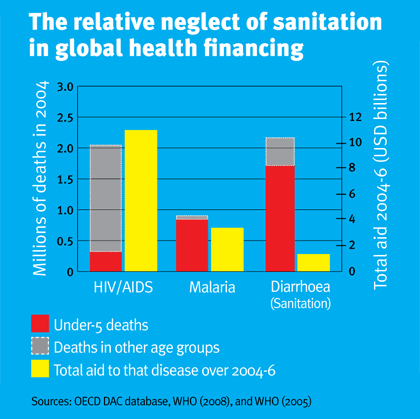Global Handwashing Day, October 15, 2008. A brilliant idea being implemented by the right organization, the United Nations. With diseases flourishing and spreading at a rampant pace throughout the developing world this initiative comes at a most critical moment.
 In the U.S. and other ‘developed’ nations diarrhea is something we treat with over the counter (OTC) medications and very rarely seek medical attention – the problem just goes away and one returns to ‘regularity.’ Well, this is not the case in the third-world, where diarrhea is a real threat – it’s a fatal disease; in fact, it is the second most common cause of death for children under the age of five. Globally, about 2 million child deaths (children under five) occur every year. (UNICEF)
In the U.S. and other ‘developed’ nations diarrhea is something we treat with over the counter (OTC) medications and very rarely seek medical attention – the problem just goes away and one returns to ‘regularity.’ Well, this is not the case in the third-world, where diarrhea is a real threat – it’s a fatal disease; in fact, it is the second most common cause of death for children under the age of five. Globally, about 2 million child deaths (children under five) occur every year. (UNICEF)
Handwashing alone, “at critical times“, can reduce diarrheal diseases by over 40% and respiratory infections by 30%. Governments of lesser developed countries should be focusing on these simple methods of disease prevention. Considering that access to resources is extremely limited in such nations it is still very possible to educate the public in an efficient, effective, and affordable manner. Printing up loads of informational pamphlets and creating micro-websites are great ideas – but people at the bottom of the pyramid have terribly low literacy rates and access to technology is just about non-existent.
—- — — –
Let’s use Pakistan as an example. A nation like Pakistan could realistically implement a nation-wide program, at very low cost, to reduce the diarrhea-related death rate – “250,000 children die of diarrhoea in Pakistan annually.” Since we already have real scientific proof that handwashing on its own greatly reduces the incidence of diarrhea, we are in a good position to assume that even the leanest campaign will save thousands of lives. A recent scientific study published in, The Lancet, and conducted in Karachi, Pakistan proved that children younger than 15 that washed their hands with soap exhibited a 53% lower incidence of diarrhea.
Here’s a concept for Pakistani health officials:
- Recruit 131 volunteers (unpaid, but with expenses reimbursed)
- Assign each volunteer to one of Pakistan’s 131 districts (124 districts + 7 tribal agencies)
- 15 Days to reach 15 pre-determined destinations in each district
- Meet officials and, more importantly, mingle with locals within each destination
- Tell them why handwashing is important. Scare them with statistics. Enthuse them with facts.
I don’t believe this is a case of ‘easier said than done.’ The expenses are rock bottom: Five paid program managers (each managing 26 volunteers); travel expenses for 131 volunteers (fuel, bus/taxi, meals, mobile phones); and that’s it, well pretty much.
Great Resources on Diarrhea and Water Sanitation:
- Rehydration Project
- Water Supply and Sanitation Collaborative Council
- IRC International Water and Sanitation Center
- World Health Organization (WHO) Pages on Diarrhea
- “Diarrhoea and respiratory infections are the main cause of child death in India” – BBC
When I was in Central Asia, handwashing was a hard sell because people didn’t want to spend the money for soap. Your volunteers will need free soap to hand out. Maybe a corporate sponsor? Tibet snow?
In Zimbabwe one of the more valuable things you could give people was soap. Soap, shampoo, things you can take from a hotel. Zimbabwe currency has no value, so buying things like this becomes absolutely impossible.
This is another issue…since the priority in impoverished places like Zimbabwe is to stay alive and address physiological needs I feel that people may sell their soap, and even if they don’t…they won’t make the investment to purchase soap after the initial donation is gone.
Tibet Snow is a great idea Alanna!
We Can Help! We are sending a cargo plane with soap to Haiti this month. Please get Hotels near you to contact us.
Each month, hotels and motels provide Clean the World Foundation their discarded soap and shampoo products. Once collected, these slightly-used products are sterilized and repurposed using environmentally-friendly and hygienically-safe recycling efforts and distributed worldwide.
If you are a hotel, motel or company that would like to donate soap and/or shampoo, please contact John Cicco, the Clean the World Foundation’s Director of Operations at jcicco@cleantheworld.org
Nepal is an under developed country and its remote western region (Jajarkot and Bajura Districts) has the worst situation of living compare to the capital and muncipality areas.Every year they have diarrhea epidemics just because of unclean drinking water with scarcity of water and poor sanitation and poor health education.Simply hand washing could prevent 40% of diarrheal deaths,I think NGOs working for long term in that area could think of solving the problem.
In our daily living we always prevent diarrhoea, practicing good hygiene is your best weapon above anything else. This can further reduce the risk of acquiring the said illness so it must be taken into consideration. Washing your hands after going to the toilet and before eating or preparing food is your best defense against microorganism-causing TD. Also, make sure any dishes and other utensils are properly cleaned and dried before use. In the event that you really have to eat outside during the course of your travel, its best advised to head to reputable restaurants with trusted hygienic environments and proper food handling and preparation.